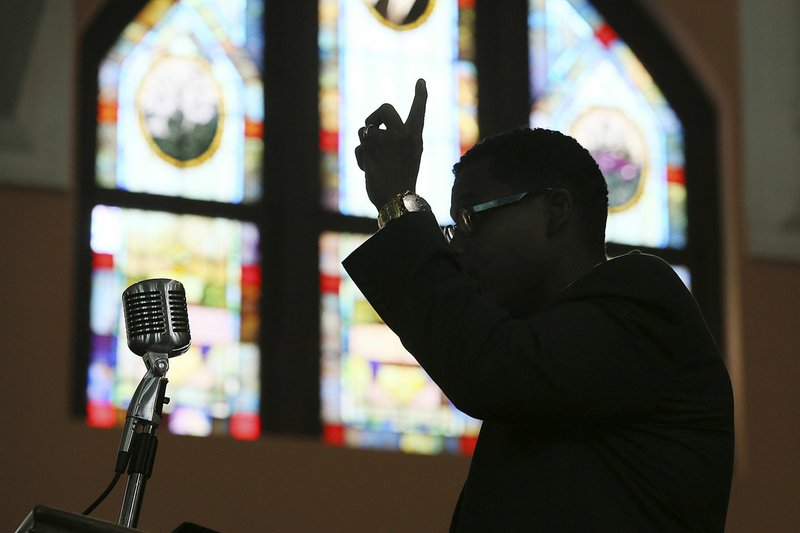One of America's most famous sermons, "Sinners in the Hands of an Angry God," probably took Jonathan Edwards close to an hour to deliver in 1741. Today, most white Protestant pastors wouldn't dare keep people in the pews that long.
In a report released in December, the Pew Research Center analyzed nearly 50,000 sermons posted online in 2019 by 6,431 churches to find out how long Christian clergy preach and the words they use that distinguish them from one another.
Pew analyzed audio, video and word count of sermons to estimate the length of sermons in different denominations. The average length of a sermon, researchers found, is 37 minutes, but there are "striking differences" across traditions:
• 14 minutes for Catholics
• 25 minutes for mainline Protestants
• 39 minutes for evangelicals
• 54 minutes for historically black Protestants
Several pastors face pressure to keep trimming the length of sermons to fit people's minimal attention spans, says the Rev. Tim Keller, the longtime evangelical pastor of Redeemer Presbyterian Church in New York City.
"I don't think most evangelical pastors are good enough for a 39-minute sermon," Keller says. "That needs to shorten."
Keller says when he started preaching 40 years ago, regular church attendance meant someone was in the pew three out of four Sundays. That number has dropped. Now, a regular churchgoer appears maybe 1.75 out of four Sundays. He wonders whether that's because many are listening to sermons via podcast or online streaming as a fallback to showing up for a service.
"If I preach a good sermon, if you're in the midst of other people, you're going to remember it more and be shaped by it than if you pick it up in a podcast somewhere," he says. "If it's totally supplemental, then it's fine. If, on the other hand, it undermines the times you're in Christian community, it's disastrous."
In a sermon heard around the world in 2018, the Rev. Michael Curry, who is the presiding bishop of the Episcopal Church, delivered a message at the royal wedding of Prince Harry and Meghan in about 13 minutes. In that message, he says, he focused on love because it was a universal theme.
"I was very aware in the sermon I was preaching that I couldn't default to Christian vocabulary," he says. He says he learned to preach to a broad range of people when he was a minister in southern Ohio, preaching to someone who did domestic work and another person with a doctorate.
Curry says he prepares his sermons throughout the week by tapping notes on his iPhone, usually telling a story with one takeaway instead of several.
"A pitfall is to explain a story too much," Curry says. "If you start explaining a story, you're messing it up. Your job is to paint the picture, tell the story."
Historically black Protestant churches have been at the center of many black Americans' lives, but more black pastors are trimming their services to adapt to people's attention spans, says Suzan Johnson Cook, who has served as a pastor for the past 30 years.
"One day a week for one hour a week, we deposit not just scripture but history and the application," says Cook, who was the ambassador for international religious freedom under President Barack Obama. "You have a lot to cover, including social issues."
The homily is a much-disputed topic in Catholic parishes, and black parishes often include longer homilies. Many priests believe that the homily, which often includes insight, theological reflection and practical challenges, shouldn't distract from the Eucharist.
The Rev. John Baldovin, a Jesuit priest who is a professor of liturgy and the sacraments at Boston College, estimates that the average Catholic priest spends two hours preparing for a sermon, devoting the rest of the week to managing the parish or other ministry needs, such as visiting people in the hospital.
"I won't preach more than 10 minutes on a Sunday," says Baldovin, who splits his time at parishes near Boston. "You can tell when people are ready for you to land a plane. There's nothing worse than listening to a plane come into the runway and take off again."
Pew's survey also found that certain words and phrases are used more frequently in the sermons of some Christian groups.
Evangelical sermons mention "eternal hell" and phrases about trespassing and sin and salvation more often than other Christian sermons; just under 1 in 10 individual evangelical sermons mention these terms. Catholic homilies tend to use "Eucharist" and "chalice" more, pointing to the focus in Catholic churches on receiving the Eucharist.
Churchgoers at historically black Protestant churches were eight times as likely than others to hear a phrase including the word "hallelujah." The language that most distinguishes sermons in mainline Protestant churches includes "disciple ... betray," and "bent ... look," phrases tied to biblical stories.
Edwards' famous sermon, "Sinners in the Hands of an Angry God," provided imagery that God holds a spider over the fiery pit of hell to describe the wrath of God. Edwards taught that you understand through your senses, not through your reasoning, Keller says, and that the purpose of the sermon is not just to make an idea clear, but to make it real.
"'Sinners in the Hands of an Angry God' is odd. It's severe and not how he preached all the time. It's a model of his method," Keller says. "The difference between clear and real is preaching that connects the truth to sensory experiences."
The churches in the survey are not representative of all houses of worship or even all Christian churches in the United States. They make up a small percentage of the estimated 350,000-plus religious congregations nationwide, Pew notes. The churches that post sermons online tend to be in urban areas and have larger-than-average congregations, according to Pew's report.
NAN Religion on 01/18/2020
